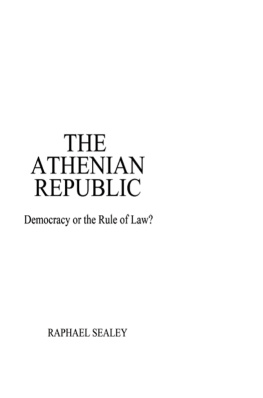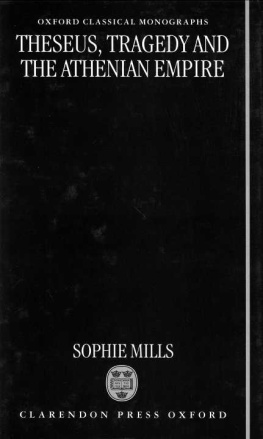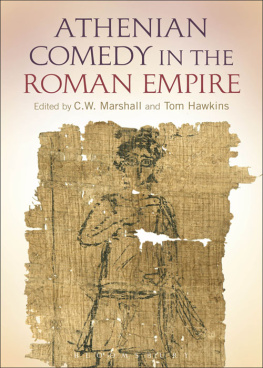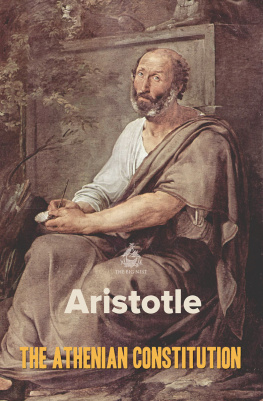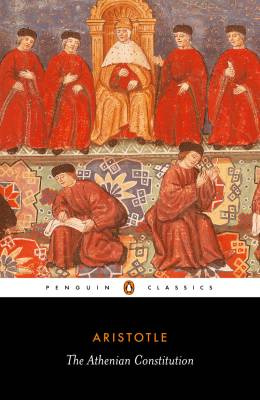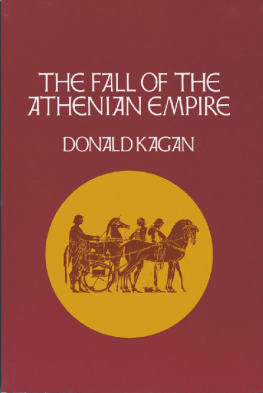Sealey - The Athenian Republic
Here you can read online Sealey - The Athenian Republic full text of the book (entire story) in english for free. Download pdf and epub, get meaning, cover and reviews about this ebook. publisher: Pennsylvania State University Press, genre: Detective and thriller. Description of the work, (preface) as well as reviews are available. Best literature library LitArk.com created for fans of good reading and offers a wide selection of genres:
Romance novel
Science fiction
Adventure
Detective
Science
History
Home and family
Prose
Art
Politics
Computer
Non-fiction
Religion
Business
Children
Humor
Choose a favorite category and find really read worthwhile books. Enjoy immersion in the world of imagination, feel the emotions of the characters or learn something new for yourself, make an fascinating discovery.
- Book:The Athenian Republic
- Author:
- Publisher:Pennsylvania State University Press
- Genre:
- Rating:5 / 5
- Favourites:Add to favourites
- Your mark:
- 100
- 1
- 2
- 3
- 4
- 5
The Athenian Republic: summary, description and annotation
We offer to read an annotation, description, summary or preface (depends on what the author of the book "The Athenian Republic" wrote himself). If you haven't found the necessary information about the book — write in the comments, we will try to find it.
Sealey: author's other books
Who wrote The Athenian Republic? Find out the surname, the name of the author of the book and a list of all author's works by series.
The Athenian Republic — read online for free the complete book (whole text) full work
Below is the text of the book, divided by pages. System saving the place of the last page read, allows you to conveniently read the book "The Athenian Republic" online for free, without having to search again every time where you left off. Put a bookmark, and you can go to the page where you finished reading at any time.
Font size:
Interval:
Bookmark:
In undertaking this study I have drawn on more kindnesses done me by more people than I can specify. The immediate impulse to write came from re-reading H. S. Maines Ancient Law, which was first recommended to me long ago by the late Idris Deane Jones. It will be readily apparent that I have drawn extensively on studies published by the late H. J. Wolff, and by E. Ruschenbusch and M. H. Hansen. Even though I have disagreed with each of them on some points, my debts to them are far greater than my doubts. Private discussion with D. Cohen has brought me pleasure and profit. I have had singularly considerate treatment from Mr. Philip Winsor of the Pennsylvania State University Press and from his two readers.
Choosing a title for the book proved to be unexpectedly difficult. English has no word precisely equivalent to Rechtsstaat. The Athenian polity was considered, but the word is archaic and affected. Republic is better, even though somewhat comprehensive. It excludes the arbitrary rule of a despot. Besides it resounds across European centuries from res publica to rzeczpospolita.
Many of the ideas presented here were developed in more polemical form in the following articles: Probouleusis and the sovereign assembly, CSCA. 2 (1968): 24769; The origins of demokratia, CSCA. 6 (1973): 25395; The Athenian concept of law, CJ. 77 (198182): 289302; The Athenian courts for homicide, CP. 78 (1983): 27596; On lawful concubinage in Athens, CA. 3 (1984): 11133; and How citizenship and the city began in Athens, AJAH. (forthcoming). I thank the editors of those journals for publishing my arguments in the first place and for agreeing to my renewed use of them.
I am also indebted to the Superior Court of Alameda County for showing me how bad Californian law is. So I decided to expound a decent system of law to some Californian students, and this book is a by-product of the lectures which I gave.
If I have succeeded in keeping my feet on the ground, I owe that to the example set by the dedicand.
Raphael Sealey
Berkeley, California
Hekataios of Miletos speaks thus: I write this, as I believe it to be true. For the utterances of the Greeks are many and, in my opinion, ridiculous.
Die Fragmente der griechischen Historiker, I 1 FI.
In 1980, for the first time in his life, the author of this essay visited Bacharach on the middle course of the Rhine and stayed for a week in a guesthouse beside the remains of the medieval wall of the town. He was impressed by continuity. People had traveled the valley by land and by boat since Roman times and probably a good deal earlier. When the authority of the city of Rome disintegrated, there was no breach of social evolution in the Rhineland, but conquerors and new settlers continued cultivating the vine and took over into their Germanic tongue not only words for useful inventions (Fenster, Ziegel) but also some for the higher arts of civilization (schreiben, dichten). Further north, at Cologne, excavation has revealed how the residence of the Roman governor of Lower Germany was transformed step by step into the dwelling of a Frankish chieftain. Even though the Empire was often an empty idea, it was never forgotten, and through the reception of Roman law in Germany in the fifteenth and sixteenth centuries Roman thought played a lasting part in the formation of the German nation.
At Bacharach the present writer thought about these things and contrasted the fortunes of his native island. In England Roman authority came to an end early in the fifth century, although the end is obscure and its immediate effect is difficult to reconstruct. Later the Norman Conquest transformed society radically. Later still the Reformation cut the country off from the rest of Europe. Surely the histories of England and of the Rhine Valley furnish a contrast between repeated catastrophe and continuity.
Ulrich von Wilamowitz-Moellendorff visited England, notably Oxford, Cambridge, and Westminster, in 1908. He was impressed there by continuity, as is shown by his reflections in his memoirs (Erinnerungen, Leipzig, second edition, 1929, 312). England had not experienced a Thirty Years War or French invasions. At Magdalen College, Wilamowitz lived in the rooms and slept in the beds where Henry VIII, the founder of the college, and Anne Boleyn had slept. Observing that in England even the wearing of wigs continued, he remarked: Die Deutschen kommen sich heute recht fortgeschritten vor, wenn sie alle solche Traditionen zerstren.
Can it be that continuity is in the eye of the alien beholder? that one sees catastrophic changes in the development of ones own land but overlooks them abroad? If so, current accounts of the Athenian constitution are anomalous. The modern student is necessarily an alien in his study of ancient Athens, and so one might expect him to discern continuity, not catastrophic change. Yet historians have commonly directed attention to a series of major changes, associated with the names of Solon, Peisistratos, Kleisthenes, and Ephialtes, and to two revolutions and restorations in the later part of the fifth century. They have inquired into the extent of each transformation. Careful illustrations of this type of inquiry are to be found in the narrative section (II, 783939) of the handbook by Busolt and Swoboda and in Hignetts history. Some authors have minimized one set of changes while magnifying others. In the field of Athenian constitutional history little attempt has been made to trace abiding habits, assumptions, or principles, although a student of comparative law would expect to find such things.
The anomaly is to be explained, in part at least, by the influence of Aristotles way of thinking. The treatise, The Constitution of the Athenians, composed by him or in his school, portrayed the history of the Athenian constitution as a series of metabolai, or changes of type. Even before 1891, when a large part of the treatise was published from the London papyrus, Aristotles approach to the study of constitutions had been influential through his Politics. One of the more original doctrines of the Politics was the attempt to distinguish different kinds of democracy. In his classificatory approach to the study of politics Aristotle was influenced not only by the habit of mind of a biologist but also by the tradition of political theory. Plato and other predecessors of Aristotle had tried to define
Instead of making a chronological narrative the starting point for understanding the Athenian constitution, this study pursues that purpose by looking into some aspects of Athenian law. This mode of proceeding turns the inquiry in the direction of discovering continuity. Historians of law have remarked on the conservatism of the two systems which have had the widest influence and the longest recorded history, namely, Roman and English law. The Athenians too were conservative in their legal institutions. They called their code the laws of Solon, even after it had been added to and thoroughly revised; their laws on homicide were couched in archaic language which Demosthenes had to explain (for example, at 9.44), and their provisions for recognizing the legitimacy of children depended in the main on the phratry, an association of obscure origin, probably older than the city itself (cf. pages 1215 and 108). The law of any community is likely to be conservative, unless foreign conquest brings radical and lasting change. Law is conservative because social opinion is reluctant to reverse itself once it has acknowledged the validity of an institution, the legitimacy of a practice, or the existence of a right. Society would rather put restrictions on the exercise of a right than subvert it wholesale.
Font size:
Interval:
Bookmark:
Similar books «The Athenian Republic»
Look at similar books to The Athenian Republic. We have selected literature similar in name and meaning in the hope of providing readers with more options to find new, interesting, not yet read works.
Discussion, reviews of the book The Athenian Republic and just readers' own opinions. Leave your comments, write what you think about the work, its meaning or the main characters. Specify what exactly you liked and what you didn't like, and why you think so.

